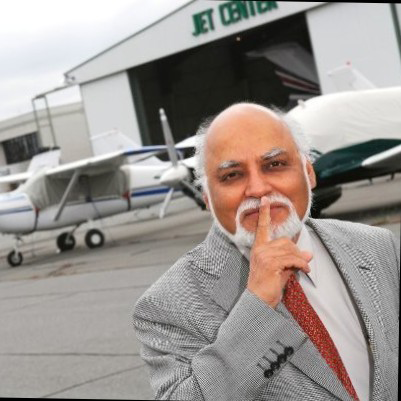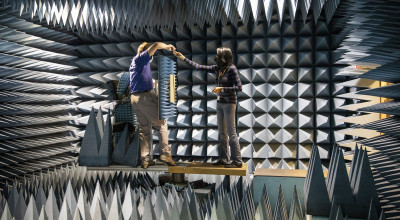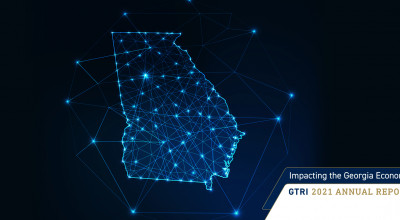

The International Journal of Aeroacoustics has recently published a special issue dedicated to Dr. Krishan "Krish" Ahuja, marking 50 years of his groundbreaking research in the field of acoustics.
This recognition from this prestigious journal is a testament to Dr. Ahuja's significant contributions and the global impact of his work, which has largely been conducted at the world-class aeroacoustics facilities of Georgia Tech Research Institute (GTRI).
Dr. Ahuja, a regents Professor in the School of Aerospace Engineering is also a Regents Researcher and is head of the Aerospace and Acoustics Technologies Division within ATAS at GTRI.
Dr. Ahuja's journey in the realm of acoustics began over five decades ago with his early involvement in jet noise research at Rolls Royce’s aero-engine division in Derby, UK. This period coincided with the expansion of air travel, highlighting the importance of reducing jet noise, a major source of noise pollution and hearing loss. Dr. Ahuja's work has played a crucial role in significantly reducing human exposure to jet noise, a remarkable feat given the increase in air travel and jet engine power over the years.
At GTRI, Dr. Ahuja has spearheaded numerous projects, including innovative research in the Anechoic Flight Simulation facility, an industry-scale anechoic chamber, and a number of unique state-of-the-art acoustic testing facilities developed by his research group. These state-of-the-art facilities, some designed to absorb sound waves completely, have been instrumental in studying jet engine noise and its impacts, especially in challenging environments like aircraft carriers.
Dr. Ahuja has authored/co-authored over 200 technical articles and reports. As a result of these contributions, he received the most prestigious award in Aeroacoustics in 1993: The AIAA Aeroacoustics Award. In 1995, he was listed in Industry Week Magazine as "One of 50 Technology Leaders in the US."
Modern techniques, such as beamforming, have enabled Dr. Ahuja to make precise identification of noise sources and frequencies in jet engine plumes, contributing to a better understanding and subsequent reduction of jet noise.
Dr. Ahuja’s esteemed career is not only defined by his exceptional research contributions but also by his collaborative spirit and dedication. He credits his success to the supportive and resource-rich environment at GTRI and the Aerospace Engineering School, which have fostered his innovative work.
“As a professor in the School of Aerospace Engineering, I have been very fortunate to have a joint appointment with GTRI,” said Dr. Ahuja. “ It allows me to select some of the best students to work on my projects at some of the best research facilities at GTRI, while the students often find interesting fundamental angles to expand that work for their Masters and Ph.D. projects, which we publish. This arrangement also enables GTRI to hire a well-trained workforce.”
The special issue of the International Journal of Aeroacoustics dedicated to Dr. Ahuja is a recognition of his profound influence on the field of acoustics. It serves as an exposition and celebration of his extensive research achievements. We take immense pride in Dr. Ahuja’s accomplishments and are thrilled to share this commendation with the entire GTRI Community. Krish’s work advances scientific understanding and has tangible avails on GTRI’s Mission's aim of improving the quality of life for people worldwide.
The International Journal of Aeroacoustics' special issue provides a comprehensive overview of Dr. Ahuja's contributions and the full extent of his research impact. Copyright prevents copying or linking directly to full Journal papers here. However, Editor-in-Chief Dr. Ganesh Raman graciously granted permission to access the issue's online table of contents, from which individual papers can be obtained. It is linked here. Via this link, readers can access the titles of papers, names of contributing authors, and the abstracts of each paper.
Writer: Christopher Weems
Georgia Tech Research Institute
Atlanta, GA
![]()
The Georgia Tech Research Institute (GTRI) is the nonprofit, applied research division of the Georgia Institute of Technology (Georgia Tech). Founded in 1934 as the Engineering Experiment Station, GTRI has grown to more than 2,900 employees, supporting eight laboratories in over 20 locations around the country and performing more than $940 million of problem-solving research annually for government and industry. GTRI's renowned researchers combine science, engineering, economics, policy, and technical expertise to solve complex problems for the U.S. federal government, state, and industry.





